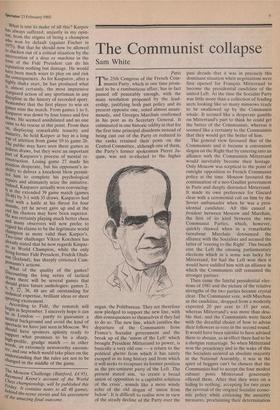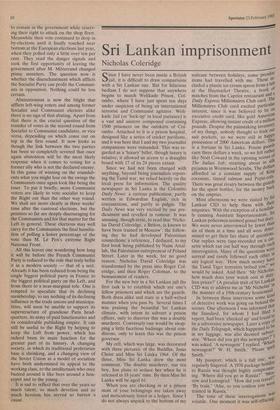The Communist collapse
Sam White
Paris
The 25th Congress of the French Com- munist Party, which at one time prom- ised to be a rumbustious affair; has in fact passed off peaceably enough, with the main resolution proposed by the lead- ership, justifying both past policy and its present opposite one, voted almost unani- mously, and Georges Marchais confirmed in his post as its Secretary General. It culminated in one historic oddity in that for the first time principal dissidents instead of being cast out of the Party or reduced to the ranks retained their posts on the Central Committee, although one of them, the Party's former spokesman Pierre Ju- quin, was not re-elected to the higher
organ, the Politbureau. They are therefore now pledged to support the new line, with dire consequences to themselves if they fail to do so. The new line, which justifies the departure of the Communists from France's Socialist government and the break up of the 'union of the Left' which brought President Mitterrand to power, is basically a very old one — a return to the political ghetto from which it has rarely escaped in its long history and from which it will seeks to recapture its former position as the pre-eminent party of the Left. The present stated aim, 'to create a broad union of opposition to a capitalist solution of the crisis', sounds like a more windy echo of the old slogan of 'union from below'. It is difficult to realise now in view of the steady decline of the Party over the past decade that it was in precisely this dominant situation when negotiations were first opened for Francois Mitterrand to become the presidential candidate of the united Left. At the time the Socialist Party was little more than a collection of feuding sects looking like so many minnows ready to be swallowed up by the Communist whale. It seemed like a desperate gamble on Mitterrand's part to think he could get the better of the Communists, whereas it seemed like a certainty to the Communists that they would get the better of him.
The general view favoured that of the Communists and it became a convenient slogan on the Right that by entering into an alliance with the Communists Mitterrand would inevitably become their hostage. Only Moscow was sceptical to the point of outright opposition to French Communist policy at the time. Moscow favoured the continuation of a neo-Gaullist government in Paris and deeply distrusted Mitterrand. It made its own preference for Giscard clear with a ceremonial call on him by the Soviet ambassador when he was a pres- idential candidate. All this caused a froideur between Moscow and Marchais, the first of its kind between the two Communist Parties, which, however, quickly thawed when in a remarkable turnabout Marchais denounced the alliance with the Socialists and accused the latter of 'veering to the Right'. This breach cost the Left the ensuing parliamentary elections which in a sense was lucky for Mitterrand, for had the Left won then it would have saddled him with an alliance in which the Communists still remained the stronger partner.
Then came the fateful presidential elec- tions of 1981 and the picture of the relative strengths of the two parties became crystal clear. The Communist vote, with Marchais as the candidate, dropped from a modestly expected 20 per cent to 15 per cent, whereas Mitterrand's was more than dou- ble that, and the Communists were faced with the dreadful choice of how to advise their followers to vote in the second round. It would have been suicidal to have advised them to abstain, so in effect there had to be a shotgun remarriage. So when Mitterrand won the presidency and in the wake of this the Socialists secured an absolute majority in the National Assembly, it was in the spirit of beggars can't be chosers that the Communists had to accept the four modest cabinet posts Mitterrand generously offered them. After that they were on a hiding to nothing, accepting for two years the reversal of the original Socialist econo- mic policy while criticising the austerity measures, proclaiming their determination
to remain in the government while reserv- ing their right to attack on the shop floor. Meanwhile their vote continued to drop in by-elections until it finally touched near bottom at the European elections last year, when they polled only a little over ten per cent. They read the danger signals and took the first opportunity of leaving the government after M. Mitterrand changed prime ministers. The question now is whether the disenchantment which afflicts the Socialist Party can profit the Commun- ists in opposition. Nothing could be less certain.
Abstentionism is now the blight that afflicts left-wing voters and among former Socialist and Communist electors alike there is no sign of that abating. Apart from that there is the crucial question of the transfer of votes in the second round from Socialist to Communist candidates, or vice versa, depending on which come out on top in the first round. It now looks as though the link between the two parties has been so completely severed that once again abstention will be the most likely response when it comes to voting for a former ally who is not the declared enemy. In this game of winning on the roundab- outs what you might lose on the swings the Communists once again look like being the loser. To put it briefly, more Communist voters are likely to vote socialist to keep the Right out than the other way round. We shall see more clearly in three weeks' time after the cantonal elections, but the pointers so far are deeply discouraging for the Communists and for that matter for the Left in general. These elections may well carry for the Communists the final humilia- tion of polling a lower percentage of the vote than M. Le Pen's extreme Right National Front.
All this leaves one wondering how long it will be before the French Communist Party is reduced to the role that truly befits it in a modern society — that of a sect. Already it has been reduced from being the single biggest political party in France to the biggest political party on the Left, and from there to a near-marginal role. One is tempted to speculate that its declining membership, to say nothing of its declining influence in the trade unions and municipa- lities, will soon be unable to support its superstructure of grandiose Paris head- quarters, its army of paid functionaries and its considerable publishing empire. It can still be useful to the Right by helping to keep the Left from power, which has indeed been its main function for the greater part of its history. A changing society, in which its traditional proletarian base is shrinking, and a changing view of the Soviet Union as a model of socialism have both undermined its appeal to the working class, to the intellectuals who once buzzed around it like bees around a hon- eypot and to the young.
It is sad to reflect that over the years so much talent, so much devotion and so much heroism has served so barren a cause.











































 Previous page
Previous page